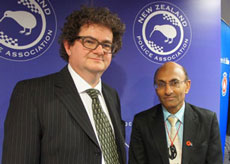Ian Yeoman outlines a 'Robocop' future for police
The Police Association Annual Conference invited Dr Ian Yeoman to talk about the future of technology, and what it could mean for future policing.

The New Zealand in which the police officers of tomorrow – as well as the victims and offenders – grow up will be a very different place to the one our current generation of police knew.
In October the Police Association Annual Conference invited Dr Ian Yeoman to talk about the future of technology, and what it could mean for future policing.
Ian painted a picture of Robocop, where society is so immersed in technology it will be linked directly to our brains and "robocops” "will be an everyday reality.
According to Dr Yeoman, the human interface with computers has already moved from keyboard and mouse to touch, and is now on the cusp of thought control.
"Digital immersion" had already begun,and was reshaping the basis of social interaction, and t he smartphone had become "our friend, part of the family ".
"We are already a strongly networked society, with more online friends than real-life friends," he said, adding that b oredom was a thing of the past.
"Once we were content with moments of empty reverie while taking the train or walking home from work. No longer – digital innovations have propelled us into a constantly connected new world."
What Dr Yeoman calls 'maximising behaviour ' – mobile social networking, online banking, e- and m-commerce meant multi-tasking and connectedness – was making us smarter and more knowledgeable. Millions of us could now harness a wealth of digital expertise, which we carried with us all the time.
Wearable technology, in the form of cameras and Google Glass, was a reality. Police already had automatic number plate-recognition technology (ANPR) in vehicles; in Dubai, police officers were trialling Google Glass to issue fines and record traffic violations.
"This is the 'flipping point ' that would take us to the realm of the "robocop," says Dr Yeoman.
The world was also on the cusp of technologies that can be immersed directly into the body, such as sensors embedded into teeth to monitor health; the human-computer interface was exploring telepathy (researchers had developed a thought-controlled wheelchair); and artificial intelligence was moving towards "singularity" or the point where computers would surpass the human brain.
The "sci-fi" technology, like that seen in TV shows such as Star Trek, had already become reality: medical tri-corders (think portable MRI scanners), replicators (3D printers), cloaking devices (smart fabrics), and even transporter beams, as physicists had used quantum teleportation to send a photon over a distance of 25 kilometres.
